Related Research Articles
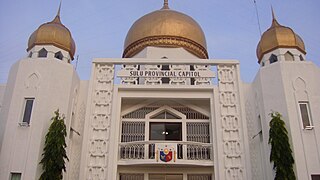
Sulu, officially the Province of Sulu, is a province of the Philippines in the Sulu Archipelago and part of the Bangsamoro Autonomous Region in Muslim Mindanao (BARMM).

Christianity is the largest religion in the Philippines. At least 88% of the population is Christian; about 79% belong to the Catholic Church while about 9% belong to Protestantism, Orthodoxy, Restorationist and Independent Catholicism and other denominations such as Philippine Independent Church, Iglesia ni Cristo, Jehovah's Witnesses, Seventh-day Adventist Church, Apostolic Catholic Church, United Church of Christ in the Philippines, Members Church of God International (MCGI) and Pentecostals. Officially, the Philippines is a secular nation, with the Constitution guaranteeing separation of church and state, and requiring the government to respect all religious beliefs equally.

Islam was the first-recorded monotheistic religion in the Philippines. Islam reached the Philippines in the 14th century with the arrival of Muslim traders, Sufi missionaries from the Ba Alawi of Yemen from the Persian Gulf, southern India, and their followers from several sultanates in the wider Malay Archipelago. The first missionaries then followed in the late 14th and early 15th centuries. They facilitated the formation of sultanates and conquests in mainland Mindanao and Sulu. Those who converted to Islam came to be known as the Moros, with Muslim conquest reaching as far as Tondo that was later supplanted by Bruneian Empire vassal-state of Maynila.

The Redemptorists officially named the Congregation of the Most Holy Redeemer, abbreviated CSsR, is a Catholic clerical religious congregation of pontifical right for men. It was founded by Alphonsus Liguori at Scala, Italy, for the purpose of labouring among the neglected country people around Naples. It is dedicated to missionary work and they minister in more than 100 countries. Members of the congregation are Catholic priests and consecrated religious brothers.

The Catholic Church in the Philippines or the Filipino Catholic Church is part of the worldwide Catholic Church, under the spiritual direction of the Pope and the Catholic Bishops' Conference of the Philippines (CBCP). The Philippines is one of the two nations in Asia having a substantial portion of the population professing the Catholic faith, along with East Timor, and has the third largest Catholic population in the world after Brazil and Mexico. The episcopal conference responsible in governing the faith is the Catholic Bishops' Conference of the Philippines.
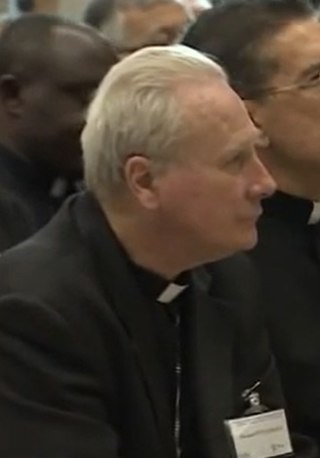
Michael Louis Fitzgerald is a British cardinal of the Roman Catholic Church and an expert on Christian–Muslim relations. He has had the rank of archbishop since 2002. At his retirement in 2012, he was the apostolic nuncio to Egypt and delegate to the Arab League. He headed the Pontifical Council for Interreligious Dialogue from 2002 to 2006. Pope Francis raised him to the rank of cardinal on 5 October 2019.

The Moro conflict was an insurgency in the Mindanao region of the Philippines, which has involved multiple armed groups. Peace deals have been signed between the Philippine government and two major armed groups, the Moro National Liberation Front (MNLF) and the Moro Islamic Liberation Front (MILF), but other smaller armed groups continue to exist. In 2017, the peace council settled around 138 clan conflicts.

The Claretians, officially named the Congregation of Missionary Sons of the Immaculate Heart of the Blessed Virgin Mary, is a Catholic clerical religious congregation of Pontifical Right for men headquartered in Rome. It was founded in July 16, 1849 by Fr. Antonio María Claret y Clará, C.M.F. They are active as missionaries worldwide, in 70 countries on five continents. The number of Claretian priests and brothers is at more than 3,000. The Congregation has a particular devotion to the Immaculate Heart of Mary and members have published extensively in Mariology.

The Missionary Society of St. Columban, commonly known as the Columbans, is a missionary Catholic society of apostolic life of Pontifical Right founded in Ireland in 1917 and approved by the Vatican in 1918. Initially it was known as the Maynooth Mission to China. Members may be priests, seminarians or lay workers. Fr John Blowick, one of the two founders of the Society, also founded the Missionary Sisters of St. Columban to share in their work. The society is dedicated to St. Columbanus. The current international headquarters is in Hong Kong.
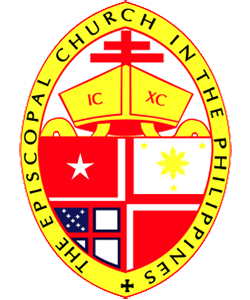
The Episcopal Church in the Philippines is a province of the Anglican Communion comprising the country of the Philippines. It was established by the Episcopal Church of the United States in 1901 by American missionaries led by Charles Henry Brent, who served as the first resident bishop, when the Philippines was opened to Protestant American missionaries. It became an autonomous province of the Anglican Communion on May 1, 1990.

The Archdiocese of Zamboanga is a Catholic archdiocese in the Philippines. Its present jurisdiction includes Zamboanga City, with suffragans in Basilan and Zamboanga Sibugay. It became Mindanao's first diocese in 1910, and was established as the second archdiocese of Mindanao in 1958. Today, the archdiocese covers a land area of 1,648 square kilometers and has a population of 442,345, of which 81 per cent are Catholics. The archdiocese includes 27 parishes and two quasi-parishes served by 49 diocesan and 18 religious priests. There are also 51 religious sisters working in the archdiocese.

The Roman Catholic Archdiocese of Cagayan de Oro is an archdiocese of the Catholic Church in the Philippines.
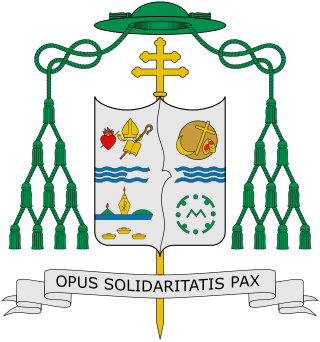
Antonio Javellana Ledesma, is a Filipino Roman Catholic clergyman who served as the Archbishop of the Metropolitan Archdiocese of Cagayan de Oro in the Philippines from 2006 to 2020.
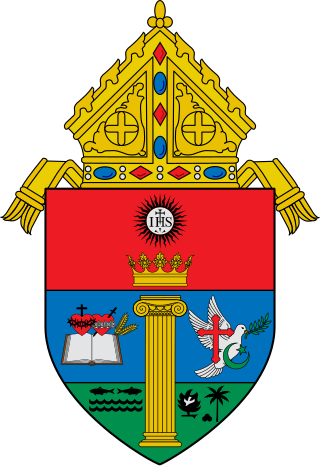
The Territorial Prelature of Isabela (de Basilan) (Latin: Praelatura Territorialis Isabellapolitana) is a Roman Catholic territorial prelature located in the province of Basilan, and its component cities of Isabela City and Lamitan City, in the Ecclesiastical province of Zamboanga in the Philippines.
The Ilagâ is a Christian extremist paramilitary group based in southern Philippines. The group is predominantly composed of Ilonggos, embracing a form of Folk Catholicism that utilizes amulets and violence.

Said Ahmad Basher is a Filipino Islamic scholar, an active Islamic preacher, broadcaster, lecturer and Islamic consultant. He is the current Chairman of the Imam Council of the Philippines. A Muslim leader and Imam, who tends to the community development, social needs, and spiritual guidance of Filipino Muslims, specifically those living in the Islamic communities in Metro Manila and nearby provinces in Luzon.
Fr. Teresito "Chito" Suganob was a Filipino Roman Catholic priest based in Marawi. He came into national public attention when he was taken hostage by ISIL-linked Maute group militants during the earlier period of the Battle of Marawi in May 2017.
Religious sector opposition against the dictatorship of President Ferdinand Marcos included leaders and workers belonging to different beliefs and denominations.
Benjamin David de Jesus, OMI was a Philippine prelate of the Catholic Church who served as the Apostolic Vicar of Jolo from 1992 until his murder in 1997. He was the first Filipino bishop to be assassinated in the history of the Catholic Bishops' Conference of the Philippines.
References
- 1 2 3 4 Harrington, Jean (2021). Far East - Remebering Rufus 'Alongan' Halley.
- 1 2 Profile of Fr Rufus Halley
- 1 2 Cullen, Shay (28 August 2011). "Fr Rufus Halley - bridge-builder and peacemaker". The Tablet. Archived from the original on 19 July 2022. Retrieved 19 July 2022.
- ↑ Donohoe, Mariam (30 August 2001). "Huge outpouring of grief for murdered priest". Irish Times . Archived from the original on 19 July 2022. Retrieved 19 July 2022.
- ↑ Rev Michael Anthony "Rufus" Halley Biography Archived 22 June 2020 at the Wayback Machine , Find A Grave (June 2020)
- ↑ "Posthumous award to Father Rufus Halley". The Catholic Communications Office. 14 May 2003. Archived from the original on 8 March 2011. Retrieved 20 June 2012.